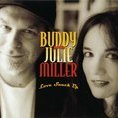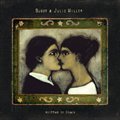Buddy MillerUniversal United House of Prayer finds Buddy Miller's feet planted firmly in the territory that the roots-country musician staked out over the course of five previous records. Again Buddy effortlessly blends a dozen American styles and idioms, again he evokes the mongrel force that breathed life into America's best mid-century pop and folk music. Yet his latest disc is also something new. The tip-off comes at once, at the top of the first track, a cover of Mark Heard's mid-tempo rocker "Worry Too Much." We hear the rapturous gospel voices of Regina and Ann McCrary (daughters of Fairfield Four founder Rev. Sam McCrary); Buddy then begins to sing of an everyday landscape where inhumanity and impoverishment portend despair ("It's the force of inertia/The lack of constraint/It's the children out playing in the rock garden/All dolled-up in black hats and warpaint"). To this problem, the next song, a black-gospel-inflected treatment of the Louvin Brothers' "There's A Higher Power," gently states the answer.Universal United House of Prayer is a song cycle, and its theme is the soul. But in its engagement with social concerns – not to mention the ecstatic earthiness of its performance quality – this record bears no resemblance to the music now marketed to Christians. "I like the way those Marvin Gaye and Staples records were sort of gospel records," Buddy says, "and sort of about the state of the world." Like its 1960's models, Universal United House of Prayer stands on the considerable strength of its music, and addresses what good music always addresses – the human predicament, and what the heart senses to be true.A cover of Bob Dylan's 1963 protest epic "With God On Our Side," clocking in at nine-plus minutes, deepens the original Dylan performance and centers the record. A chronicle of militaristic misuses of God's name, it is held in compelling focus by the steady, grim development of the Irish-dirge-like arrangement – Jim Lauderdale's sporadic tenor, Brady Blade's hyper-creative drumming – but even more by Buddy's vocal, which transmutes the anger of the original to a profound sorrowfulness. George W. Bush's war machine is clearly implicated, but the true weight of the update lies in its emotional authenticity – in, for instance, the singer's controlled dismay that "God" and "our side" should inhabit, repeatedly, the same clause.Buddy's songwriting is amplified by a strong group of collaborators. "This Old World," written with Victoria Williams, employs the kind of sweetly didactic playfulness that animated Woody Guthrie's songs for children. There are four co-written with wife Julie, of which "Shelter Me" and "Wide River to Cross" – a beautiful duet with Emmylou Harris – stand out as perfect gems, hymnlike in their melodic clarity and all the stronger for their contemporary verbal transparency. On "Is That You," Buddy addresses God directly, his voice hushed and reverent, his words conversationally inquisitive: "Did you wear a crown, and was it made of thorns?…Did you go down to Hell and back for me?" Here is a guileless soul standing humbly before an awesome mystery. Here too is a precise understanding of the genius of Pops Staples. In fact, the record continually reminds the listener of the Staples' large-spirited ability to project divinity onto matters great and small.Over nine years, the cast of players on Buddy's records has remained relatively stable, and the ambience of his home studio and favored machinery (Wandre electric guitar, Vox AC30 amp, deep tremolo) has become instantly recognizable. At the same time the experimental, concept-driven edge of his arrangements and mixes has proceeded outward. Check out the compressed cacophony of the chorus of "Don't Wait" – watch your VU meters jump to +3 and stay motionless for 8 bars. Enjoy that song's neo-futurist breakdown. Feel the whole band breathe as one on "Fall on the Rock." Hear Phil Madeira's accordion spring boldly from nowhere; admire the ultra-smooth hand-offs between Buddy's guitar and Tammy Rogers's fiddle. And there's nothing much to do about Brady Blade's and Bryan Owings's drumming but laugh, and marvel. The percussionist typically has the freest hands on a Buddy Miller record, and these guys make the most of the latitude. Results like these don't come from either planning or improvisation, but an inspired balance between the two, a kind of managed freedom. One feels lucky to hear an artist creating at this level of intelligence and confidence, especially one roughly identified with "country," a form which lately has been so cheapened by pandering common-man impersonators.Behind the music is a modest man of extraordinarily broad skills. Emmylou Harris, in whose band Buddy served for 8 years, calls the 51-year old Ohio-born Nashville transplant "one of the best guitar players of all time." Steve Earle, another former bandmate, pronounces him "the best country singer working today." Records by artists ranging from Lucinda Williams to Trisha Yearwood have benefited from Buddy's vocal and instrumental prowess. As for the taut, elegiac songs he composes, they could be mistaken for disinterred relics, resonant of a lost age when white and black music were casually consanguineous – could be, only cover versions by hitmakers like Lee Ann Womack, Brooks & Dunn, and the Dixie Chicks have proved their contemporary power, affirming Buddy as one of Music City's most valuable writers. Then there is his superiority as a producer and engineer (Harris, Jimmie Dale Gilmore, Jim Lauderdale). And he has a nice sideline mastering records.Buddy is a master of many disciplines – but note how all this mastery is ultimately pressed into service. With Your Love and Other Lies (1995), Poison Love (1997), Cruel Moon (1999), the co-billed Buddy and Julie Miller (2001, a 2001 Grammy™ nominee for Best Contemporary Folk Album), Midnight and Lonesome (2002), and his latest, Buddy has created a niche in American music all his own. Here, rich tones are coaxed from plastic guitars and trash cans; human desires are unveiled, picked over, mourned; remote musical origins are honored. A living room, a Pro Tools rig, and a complement of vintage mikes make, somehow, an environment no proper studio can. Buddy's singularity is in his willingness to subordinate his extravagant technical gifts to a specific program: the creation of a music that is purposefully personal, naturally eccentric, and spiritually substantial. In this way he is to music as someone like Michael Powell is to film or Flannery O'Connor to literature. He is, simply, a thoroughgoing auteur, the only one in country music.Julie MillerIn April of 1997, an album by an artist most people had never heard of landed smack dab in the middle of the music public's consciousness with the kind of impact reserved for only a special few. That album was Blue Pony, and the artist was Julie Miller, whose HighTone Records debut launched a torrent of accolades for the willowy singer/songwriter who not so much sang her lyrics as surrounded them with a passion and honesty which reached inside the body and grabbed the soul. It was the kind of performance that set a personal standard for Julie to reach for in future recordings.Over two years later, that standard has been exceeded by the incredible performance on Miller's follow-up album, Broken Things. With a voice and an attitude that shift between little-girl innocence and womanly worldliness--often within the same song--Julie Miller has created a showcase of the human spirit, bathed in a lyrical wash of images that both comfort and arouse. Blessed with the talent of one of the most inspirational songwriters in contemporary music, Julie enhances her poetry with a musical delivery that carries these songs to even greater heights of emotion.Her roots are planted deep in the soil of Texas–for the first seven years in the small town of Waxahachie, then in the more liberal atmosphere of Austin, which at the time was beginning its emergence as a musical birthing ground for the co-mingling of rock, blues, country, folk and border styles. Amid her mom's records and the free-style sound waves of FM radio, Miller began to develop an interest in singing and songwriting through the influences of Jerry Jeff Walker, Muddy Waters, Emmylou Harris, and especially Gram Parsons. She made her professional singing debut at the age of sixteen, and soon thereafter, as the "chick singer in the band," joined up with future husband Buddy Miller. The two spent time in New York and Los Angeles–among other locations–before settling in Nashville in 1993.Julie Miller received her first real attention with the release of Buddy Miller's 1995 HighTone debut, Your Love And Other Lies, for which she co-wrote several songs and sang on three. Her songwriting soon attracted the attention of Emmylou Harris, who recorded Julie's "All My Tears," as did jazz vocalist Jimmy Scott. Harris asked Buddy Miller to join her touring band as lead guitarist, and Julie joined in on a few Nashville shows. Around that same time, Buddy and Julie teamed up with Victoria Williams, Mark Olson, and Jim Lauderdale for a series of European dates as "The Rolling Creek Dippers."Emmylou Harris, as well as Steve Earle and Karen Perris of Innocence Mission, guested on Miller's album Blue Pony, which generated reams of critical praise and brought Julie's talents to center stage. Entertainment Weekly called it "one of the year's most haunting surprises," giving it an A rating. During 1997 and 1998, Miller joined her husband Buddy on tour with Emmylou Harris and Steve Earle, opening most of their dates in North America and overseas.During the early months of 1999, Julie Miller began recording the tracks for Broken Things at the couple's Nashville home studio. As on Blue Pony, Buddy brought in his Spyboy teammate Brady Blade to play drums. He was joined on some tracks by such other musical friends as NRBQ bassist Joey Spampinato, bassists Byron House and Alison Prestwood, keyboardist/accordion player Phil Madeira, and percussionist Steve Hindalong. Buddy Miller co-produced the album and played his usual assortment of guitars, bass, melodica, and harmonium. As harmony singers, the Millers reach stellar heights, each accompanying the other perfectly.Except for the traditional ballad, "Two Soldiers," Julie Miller wrote all of the songs on the new album. As on her first record, she combines elements of rock, folk, and blues, as well as English and Celtic music, to shape a sound all her own. But Broken Things packs an even bigger punch than its predecessor. The album's opener, "Ride The Wind To Me," sets the tone with a ringing guitar sound married to Julie's straight-on vocals. "I Know Why The River Runs" is a haunting tale of love and redemption carried along by the Millers' harmonies, and "I Need You" simply rocks, with Julie exhorting "I need something like morphine, only better/ I need something like a kiss, that lasts forever." It highlights the battle between the worldly and the spiritual always raging in her songs.The scene shifts with "I Still Cry," a beautiful ballad about loneliness and love lost, aided by a Patty Griffin harmony vocal, with the guitar, piano and accordion mimicking the falling leaves of autumn. "Out In The Rain" brings things back to the rockin' side of town, fueled by Buddy's guitar work, which recalls that of Bob Dylan and Tom Petty. On "Orphan Train," Julie and Victoria Williams match their voices with the sounds of an old English folk song, accented by such instruments as the bouzouki and hurdy-gurdy.The title track is a very special song to Julie. It's one she's sung at shows over the last several years and has become an audience favorite. "I wrote this song in 1993," she remembers. "This year, the violence in Northern Ireland ignited in Omagh, resulting in a tragedy beyond a heart's ability to comprehend, killing 29 innocent people, injuring hundreds. Juliet Turner sang this song at the memorial service, and I continue this dedication to these families and all whose hearts are broken things." Emmylou Harris adds a beautiful harmony vocal to the track."Emmylou Harris and Little Jimmy Scott both did amazing renditions of' 'All My Tears'," says Julie. "Buddy and I spent parts of 1997-98 on tour with Steve Earle, whose rockin' mandolin was the inspiration to re-record the song. I told him he was my favorite mandolin player. He said, 'I'm sorry'."Traveling around Nashville inspired Julie to use the traditional ballad "Two Soldiers," which features another great vocal from Emmylou Harris. "In my neighborhood are many historical markers where Civil War battles were fought. I drive down a street called Warfield to go to the grocery. I think of their blood under my feet when I walk in my yard."On "Maggie," Julie sings: "She smiles like the stars and her hair is raven/ She's a beautiful angel sent from heaven," to describe the title character, who hides her secret memories inside her heart while she visits the barrooms, dancing in the dark."Strange Lover" shifts gears once again, as Julie teams up with Steve Earle for one funky bit of wildness, accentuated by Buddy's booming bass line and caroming guitar, Phil Madeira's spooky organ, and Brady Blade's pounding drums."The Speed Of Light" brings it all back home, with just Julie's guitar and Buddy's harmonium giving flight to a song of love and hope.On Broken Things, Julie Miller's heartfelt lyrics and passionate voice bare her soul and her emotions, painting a masterpiece of good and evil, hope and despair, love and loneliness.





